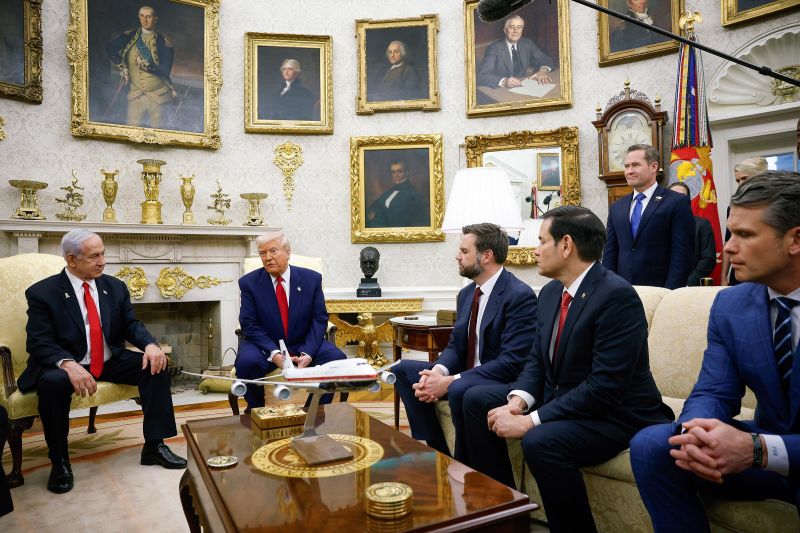If Israeli Prime Minister Benjamin Netanyahu was looking for the easy political victories that once gushed from US President Donald Trump, he left the Oval Office empty-handed.
The meeting was supposed to be about the two leaders negotiating the new 17% tariff the White House imposed on Israeli exports last week. In a gamble to avoid them, Israel had dropped its own tariffs on American products to zero a day earlier, even though they were only imposed on very few items.
Seated next to Trump in the White House, Netanyahu said Israel would eliminate trade barriers and trade deficits “very quickly.” With his usual effusive praise of Trump, the long-serving Israeli leader said, “We are going to eliminate the tariffs and rapidly.”
It made no difference to Trump. He pointed out that Israel gets $4 billion a year from the United States – “Congratulations, by the way. That’s pretty good,” he said – but he would not commit to changing his plans.
“Maybe not, maybe not,” he said when asked if he would reduce the tariffs.
For years, Netanyahu grew accustomed to political gifts from Trump, especially during the first Trump administration. Moving the US embassy to Jerusalem, recognizing the occupied Golan Heights as part of Israel, normalizing relations between Israel and two Arab Gulf countries, and many more – Netanyahu was always eager to celebrate these decisions and the president who made them.
Netanyahu was quick to point out that he was not only the first foreign leader to visit Trump during his second term, he was also the first to meet him to negotiate tariffs. But this meeting left Netanyahu with no clear deliverables or US promises for which he could take credit.
The biggest blow of all was on one of Netanyahu’s favorite topic: Iran. For days before the highly anticipated meeting, Israeli media were rife with speculation that the two leaders would discuss military strikes on Iran. The top Sunday headline in Israel’s most prominent newspaper, Yedioth Ahronoth, shouted “IRAN FIRST” and said the Islamic Republic would need to suffer a “heavy blow” before negotiating. The presence of at least six US B-2 stealth bombers in the Indian Ocean and a second aircraft carrier in the Middle East only fueled speculation in Israel that a strike was not only possible, but increasingly probable.
Ultimately, the biggest headline was about Iran, but almost certainly not in the way Netanyahu expected.
Trump announced that the US and Iran were about to begin talks on the potential for a new nuclear agreement. Netanyahu has been aware that Trump was pursuing talks with Iran, but the sudden revelation of the imminent talks – set to begin Saturday – appeared to surprise the prime minister. The smile quickly vanished from his face as he looked toward his team of advisers.
Before flying back to Israel, Netanyahu laid out his position.
“We agree that Iran will not have nuclear weapons. This can be done by an agreement, but only if this agreement is Libyan style,” he said, referring to a 2003 deal under which Libya voluntarily agreed to fully dismantle its nascent nuclear program. But if Iran drags out the talks, Netanyahu said he discussed the military option “at length” with Trump.
In Israel, the damage was already done.
“If (Trump) started the negotiation without our knowledge, it means that he’s going to represent the American interest only,” said Ronni Shaked, a researcher with the Truman Institute at Hebrew University. If Israel knew in advance, Netanyahu could have contributed with “some ideas, some new facts, some new intelligence,” Shaked said. “But here it’s nothing, nothing at all.”
Trump’s effusive praise of Turkish President Recep Tayyip Erdogan – one of Israel’s most vociferous critics since the start of the war in Gaza – was another surprising line in a press conference full of them.
Last year, Erdogan called on God to “punish” Netanyahu and said at an election rally, “We will send the person called Netanyahu to Allah.” For months, Erdogan has kept up a steady stream of anti-Israel – and specifically anti-Netanyahu – rhetoric.
Sitting right next to Netanyahu, Trump heaped praise on Erdogan. “I have great relations with a man named Erdogan,” Trump said. “He’s a tough guy. He’s very smart.” Trump said he thought he could work out any disagreement between Turkey and Israel.
“I think it was especially embarrassing for Netanyahu, because last week, Erdogan said he thinks Israel should be destroyed or eliminated,” said Alon Liel, Israel’s former ambassador to Turkey. “It was a very small part (of the press conference), but very meaningful.”
During a speech marking the Muslim holiday of Eid al Fitr on March 31, Erdogan called on God to “condemn Israel to misery.”
Trump did give Netanyahu some political cover back home. The two leaders said they’re working on another deal to bring Israeli hostages back from Gaza. Trump said Netanyahu was working on it constantly, even as the Israeli leader faces continued criticism that he’s not doing enough to return the hostages.
Trump said he’d like to see the war stop “and I think the war will stop at some point, that won’t be in the too-distant future.” For Netanyahu, a ceasefire would be a poisoned chalice, since his government relies on the support of far-right parties that adamantly oppose an end to the war.
Referring to Netanyahu by his nickname, Shaked said, “Bibi is coming back home with empty, empty hands. Not Iran, not Gaza, not the kidnapped people. Nothing at all.”

